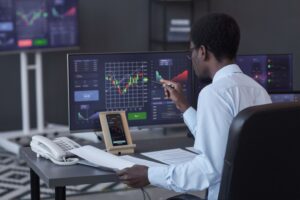In the fast-paced world of forex trading, making consistent profits can be challenging. Emotions, market fluctuations, and human errors often affect traders’ decisions. This is where mechanical trading systems come in. These systems eliminate emotion from the process, relying on strict rules to guide trading decisions.
But what exactly is a mechanical trading system, and how can it help you as a trader? In this article, we’ll dive into what these systems are, how they work, and how they can transform your forex trading experience.
What Are Mechanical Trading Systems?
A mechanical trading system is simply a set of rules that dictate when to buy or sell currency pairs. These systems take away the guesswork, allowing traders to follow a clear strategy without emotional interference.
Mechanical systems can use various strategies, such as moving averages, trendlines, or other technical indicators. The primary advantage is consistency. By following fixed rules, the system minimizes human errors, and traders can trade with more confidence.
Mechanical trading systems provide a structured approach to trading, making it easier to avoid impulsive decisions based on emotions. The key benefit is clear: with a mechanical system, your strategy becomes predictable, reducing the risk of costly mistakes.
How Automated Forex Trading Works
When we talk about mechanical trading systems, we often refer to automated forex trading. Automated systems are designed to execute trades automatically, based on the pre-established rules you’ve set up.
This means you don’t need to sit in front of your computer screen all day. Once you’ve set your parameters, the system handles the rest, buying and selling currency pairs when the conditions are met.
Automated forex trading brings significant advantages. For instance, the market never sleeps, but you do. While you rest, your automated system continues to trade, taking advantage of every opportunity. This allows for round-the-clock trading without requiring constant monitoring.
The Importance of Trading Discipline
One of the most challenging aspects of forex trading is maintaining discipline. Emotions often influence decisions, leading to impulsive trades, overtrading, or holding onto a losing position for too long.
Mechanical trading systems help to solve this problem by sticking to predefined rules. This means no matter how the market moves, your trading plan remains unchanged. The system’s rigid structure reduces the temptation to make rash decisions based on short-term market fluctuations.
Trading discipline is crucial, and mechanical systems provide a way to enforce it. By removing emotions from the equation, you can follow your strategy without hesitation, which is a key element of successful trading.
Backtesting Performance: Test Before You Trade
Before using any mechanical trading system in a live market, it’s important to backtest it. Backtesting involves running your system on historical data to evaluate its performance.
For example, you might create a system that buys when a currency pair’s price crosses above a moving average and sells when it falls below a certain level. By backtesting this system, you can check how it would have performed in different market conditions.
Backtesting provides valuable insights, allowing you to see if your system is effective before risking real money. However, remember that past performance doesn’t guarantee future results. It’s crucial to adjust your system as market conditions change.
Understanding Algorithmic Trading
Mechanical trading systems are simple and straightforward, but some traders may opt for algorithmic trading. Algorithmic trading uses complex mathematical models and algorithms to make decisions and execute trades automatically.
The biggest advantage of algorithmic trading is speed. Algorithms can process vast amounts of data and execute trades in fractions of a second. This is particularly useful for strategies like high-frequency trading or scalping, where timing is critical.
While algorithmic trading offers increased efficiency and precision, it’s not always necessary for beginners. A basic mechanical trading system can still be effective, especially if you’re just starting to trade. As you gain experience, you may decide to explore algorithmic trading for even greater performance.
The Benefits of Mechanical Trading Systems
Mechanical trading systems come with several clear benefits:
- Consistency: The system follows your rules every time, ensuring you trade consistently.
- Reduced Human Error: By removing the human factor, these systems reduce mistakes caused by emotional reactions or poor judgment.
- Backtesting: Before committing real money, you can test your system against historical data to evaluate its potential.
- 24/7 Trading: Automated systems allow you to take advantage of market opportunities even when you’re not actively trading.
- Built-in Risk Management: Many systems include risk management features like stop-loss orders, which help protect your capital.
The Challenges of Mechanical Trading Systems
Despite the advantages, mechanical systems come with their own set of challenges:
- Over-Reliance on Backtesting: Just because a system performed well in the past doesn’t guarantee future success. It’s crucial to keep testing and adjusting your strategy.
- Technical Issues: Mechanical systems depend on technology, so technical failures can disrupt trading. Regular monitoring is necessary to ensure the system functions smoothly.
- Rigid Rules: Mechanical systems follow strict rules, which can make it difficult to adapt quickly if market conditions change unexpectedly.
- Over-Optimization: Some traders make the mistake of over-optimizing their systems for past performance, resulting in a system that may not perform well in real-time trading.
Conclusion: Is a Mechanical Trading System Right for You?
Mechanical trading systems offer a structured, disciplined approach to forex trading. By removing emotions and sticking to predetermined rules, these systems can improve consistency and help you make more informed decisions.
However, no system is perfect. It’s essential to backtest, monitor performance regularly, and adapt to changing market conditions. Mechanical systems are best suited for traders who want to automate their strategies, improve discipline, and reduce the impact of emotions on trading.
If you’re looking for a way to streamline your forex trading and increase consistency, a mechanical trading system might be the solution you’ve been searching for. The key is finding the right system that aligns with your trading goals and style.

I’m Chaitali Sethi, a financial writer and market strategist focused on Forex trading, market behaviour, and trader psychology. I simplify complex market movements into clear, practical insights that help traders make better decisions and build a stronger trading mindset.

